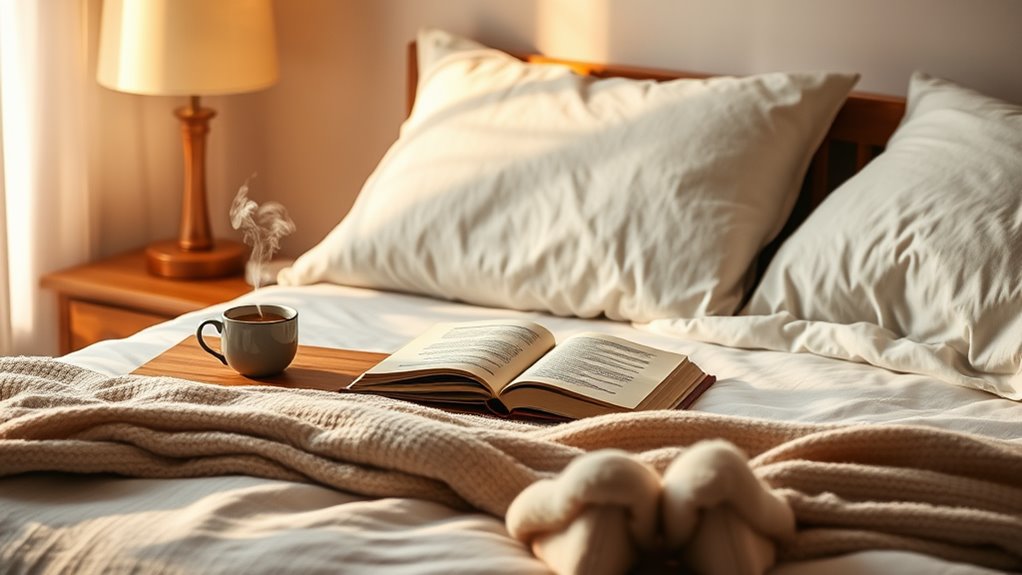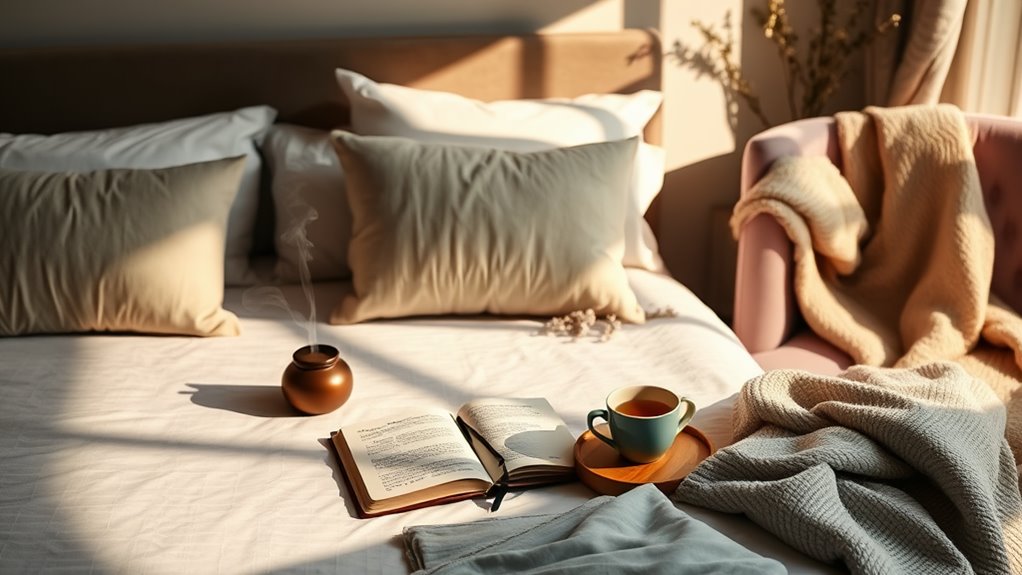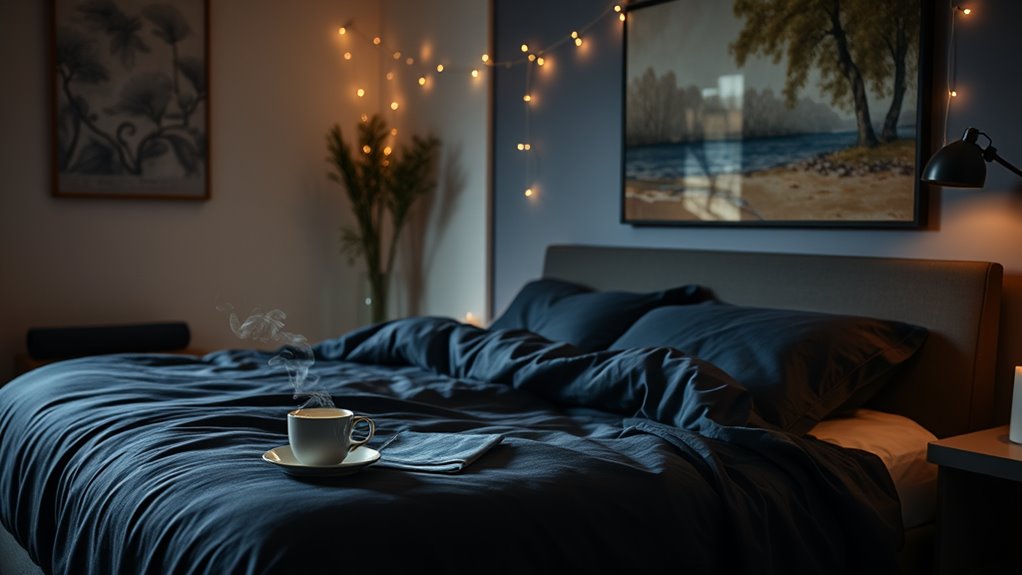The Perfect Evening Routine for Stress-Free Sleep!
To create the perfect evening routine for stress-free sleep, start winding down at the same time each night. Dim the lights and turn off electronics to set a calming atmosphere. Consider organizing tasks for the next day with a to-do list to ease your mind. Incorporate gentle activities like reading, warm baths, or deep breathing exercises to relax your body and reduce tension. Aim for a consistent bedtime and keep your room cool and quiet. With these steps, you’ll lay the foundation for restful sleep and improved mood—discover more tips to enhance your routine for even better results.
Importance of an Evening Routine
An evening routine acts as a bridge between your busy day and restful night, setting the stage for quality sleep. It’s essential because it helps signal to your body that it’s time to wind down. When you establish a consistent routine, your mind and body learn to relax, making it easier to transition into sleep.
By prioritizing an evening routine, you create a calming atmosphere that reduces stress and anxiety. You’re giving yourself dedicated time to disconnect from the day’s chaos, allowing your thoughts to settle. This practice not only helps in lowering cortisol levels but also enhances your overall well-being.
Moreover, a well-structured evening routine can improve your sleep hygiene. You’re more likely to avoid screens and stimulating activities, which can disrupt your ability to fall asleep. Instead, you can engage in soothing activities, like reading or gentle stretching, that prepare your mind for rest.
Ultimately, the importance of an evening routine lies in its ability to foster a sense of control over your day. When you consciously carve out this time, you’re investing in better sleep, improved mood, and a more energized tomorrow. So, make it a priority!
Practical Steps for Transitioning
As you prepare to transition into your evening routine, it’s helpful to choose a consistent time to start winding down each night. This sets a clear boundary between your day and the relaxation period ahead. Aim for about an hour before bed to begin this process.
Next, create a calming environment in your space. Dim the lights, turn off electronics, and eliminate distractions. You want to signal to your brain that it’s time to relax.
Consider organizing your tasks for the next day earlier in the evening. Jot down a to-do list, so you can release those thoughts and focus on unwinding.
Incorporate gentle activities that help signal bedtime, like reading a book or taking a warm bath. These actions prepare your mind and body for sleep.
Finally, develop a consistent bedtime. Going to bed at the same time each night helps regulate your sleep cycle, making it easier to fall asleep when you need to. By implementing these practical steps, you’ll create a seamless transition into a peaceful evening routine that sets the stage for restful sleep.
Relaxation Techniques to Try
To ease into your evening routine, consider trying various relaxation techniques that can help calm your mind and prepare your body for sleep. These practices not only promote tranquility but also signal to your body that it’s time to wind down. Here are three effective techniques you can incorporate:
-
Deep Breathing: Take slow, deep breaths to lower your heart rate and alleviate tension. Inhale deeply through your nose, hold for a few seconds, and exhale slowly through your mouth. Repeat this several times to feel more relaxed.
-
Progressive Muscle Relaxation: Starting from your toes, tense each muscle group for a few seconds and then relax them. This method helps release physical tension and can make you more aware of the sensations in your body.
-
Mindfulness Meditation: Spend a few minutes focusing on the present moment. Sit in a comfortable position, close your eyes, and concentrate on your breath or a calming mantra. This practice can help clear your mind of racing thoughts and promote a sense of peace.
Try these techniques regularly, and you’ll likely notice an improvement in your ability to drift into a restful sleep.
Science-Backed Sleep Habits
Establishing effective sleep habits can significantly improve your overall quality of rest. One of the most crucial habits is sticking to a consistent sleep schedule. Going to bed and waking up at the same time every day helps regulate your body’s internal clock, making it easier to fall asleep and wake up refreshed.
Another important habit is limiting screen time before bed. The blue light emitted by phones, tablets, and computers can interfere with melatonin production, making it harder for you to doze off. Aim to turn off screens at least an hour before bedtime.
Incorporating a wind-down period into your evening routine can also enhance your sleep quality. Engage in calming activities like reading, journaling, or gentle stretching to signal to your body that it’s time to relax.
Additionally, be mindful of your caffeine and alcohol intake. Consuming these substances too close to bedtime can disrupt your sleep patterns.
Finally, consider keeping a sleep diary. Tracking your sleep habits and how you feel can help identify patterns and areas for improvement, leading to more restorative nights. Implementing these science-backed habits can pave the way for a better night’s sleep!
Creating a Sleep-Inducing Environment
Creating a sleep-inducing environment can make a world of difference in your ability to drift off peacefully. By setting the right atmosphere, you can signal to your body that it’s time to relax and prepare for sleep. Start by focusing on three key elements: lighting, noise, and temperature.
- Lighting: Dim the lights an hour before bed. Consider using blackout curtains or an eye mask to block out any unwanted light.
- Noise: Keep noise levels low. If you live in a noisy area, consider using a white noise machine or earplugs to help drown out distractions.
- Temperature: Aim for a cool room temperature, ideally between 60-67°F (15-19°C). This range helps your body naturally lower its core temperature, promoting a restful night’s sleep.
Frequently Asked Questions
How Long Should My Evening Routine Last for Effectiveness?
Your evening routine should ideally last between 30 to 60 minutes. This timeframe allows you to unwind, relax, and prepare your mind and body for sleep without feeling rushed or overwhelmed by the day’s events.
Can I Adjust My Routine on Weekends?
Absolutely, you can adjust your routine on weekends! Feel free to shift your activities and timing to suit your lifestyle. Just remember to maintain some consistency to help your body stay in sync.
What if I Can’t Fall Asleep After My Routine?
If you can’t fall asleep after your routine, don’t stress. Get up, do something relaxing, like reading or listening to music, then return to bed when you feel sleepy. It’s all about finding what works for you.
Are There Any Foods to Avoid Before Bedtime?
Before bedtime, you should avoid caffeine, heavy meals, and sugary snacks. These foods can disrupt your sleep cycle, making it harder for you to wind down. Stick to light snacks if you’re hungry.
How Can I Track My Evening Routine Progress?
You can track your evening routine progress by keeping a journal, using an app, or setting reminders. Note your activities and feelings each night, then review weekly to identify patterns and make adjustments.




